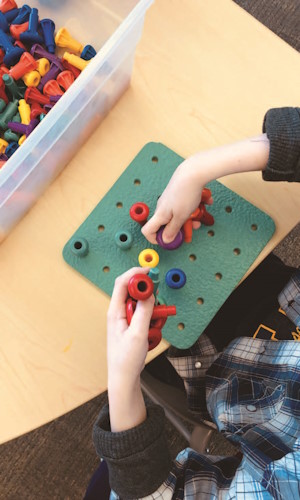Who’s On Your Child’s Team? OTs Empower Students with ADHD
Lori Flynn, OTR/L
Attention Magazine August 2023
Download PDF
Occupational Therapists Empower Students with ADHD in the Classroom
Students with ADHD often require a variety of individualized supports within the school system to be able to access their education. School-based occupational therapy (OT) is a highly effective school-based support service for students with ADHD. However, it is often underutilized in schools due to a lack of understanding and knowledge of what OT can offer students with ADHD.
 Similar to ADHD, the role of an occupational therapist is surrounded by myths and misconceptions, suffers from terrible name branding, and is challenging to understand due to its broad scope of impact. The full role of an occupational therapist in school is much broader than just addressing fine motor skills or sensory processing.
Similar to ADHD, the role of an occupational therapist is surrounded by myths and misconceptions, suffers from terrible name branding, and is challenging to understand due to its broad scope of impact. The full role of an occupational therapist in school is much broader than just addressing fine motor skills or sensory processing.
Occupational therapy is an evidence-based health profession that focuses on developing, restoring, or modifying performance in any of the skills people need to function independently in the various “occupations” that constitute their daily life. In the school setting, the OT’s role is to help children with disabilities participate and perform in the school activities needed to reach their educational goals, which can include academic work, self-care, social interactions, and play.
To truly understand the unique value of occupational therapy specific to ADHD, the reader must zoom out to see that the overarching goal of school-based occupational therapy is to facilitate performance in any meaningful or necessary occupation that an individual participates in throughout the school day. The scope of occupational therapy is both endless yet singular.
Performance
Russell Barkley, PhD, best conceptualizes ADHD as a disorder of performance. In his factsheet, “The Important Role of Executive Functioning and Self-Regulation in ADHD,” he explains:
“Disorders of EF or self-regulation, like ADHD, pose great consternation for the mental health and educational arenas of service because they create disorders mainly of performance rather than of knowledge or skills. Mental health and education professionals are more expert at conveying knowledge—how to change; far fewer are expert in ways to engineer environments to facilitate performance—where and when to change.”
School-based occupational therapists are “experts in engineering environments to facilitate performance.” OTs have extensive knowledge of the skills and abilities required for successful participation in daily classroom tasks and activities. OTs have expertise in the areas of motor skills, sensory processing, visual-perceptual skills, cognitive skills, and executive functioning as they relate to a child’s ability to participate in school-based activities and routines.
Tiers of OT support
In the past, occupational therapy was mainly restricted to students with an Individualized Education Program (IEP) or a 504 plan. However, with the 2004 legislation, school-based OTs can now offer multi-tiered levels of support to all children with ADHD based on their individual needs.
The three levels of support include universal supports, which are offered to all students in the classroom regardless of their needs; targeted support, which is provided to students who need additional support beyond the universal classroom supports; and intensive support, which is provided to students who require the most assistance and is typically provided through individualized interventions.
Occupational therapists use a holistic approach that evaluates all aspects of performance across the school setting. To improve performance for students with ADHD, the school-based OT identifies the barriers to the child’s performance and intervenes in three ways:
- Providing caregiver/interprofessional education
- Developing environmental or task modifications
- Developing targeted interventions for the underlying skills that impact classroom
Caregiver education
Caregiver education is a critical component to reducing secondary complications for children with ADHD. Teachers are the least supported caregivers in the lives of children with ADHD. School-based OT practitioners provide multi-tiered levels of caregiver education to support students with ADHD.
Universal support: School based OTs provide interdisciplinary education and resources to assist in developing all teachers’ understanding of the effects of ADHD on a student’s participation and performance. This often includes training on strategies for working with students with ADHD, as well as how to use accommodations and modifications in the classroom.
Targeted support: OTs provide targeted support on behalf of the student through ongoing collaborative consultation. Collaborative consultation provides the teacher with a clear understanding of ADHD and common comorbidities as it relates to the specific student. For example, such consultation may focus on developing a teacher’s understanding about how ADHD with co-occurring dyslexia affects the student’s performance in written expression. The occupational therapy practitioner provides ongoing modeling and implementation guidance of educational and behavioral management techniques specific to the unique student.
Intensive support: “Conjoint consultation” is an effective way to involve parents and teachers in supporting a student’s academic and behavioral success. School-based OTs assist in facilitating effective collaboration between parents and teachers to bridge the gap between the home and school environment. School-based OTs can help families to understand the impact ADHD can have on homework, before-school routines, sleep hygiene, and organization.
Accommodations and modification
Children with ADHD show significant fluctuations in symptom severity and performance across diverse environments, situations, settings, and activities. Context is everything when it comes to ADHD, as performance does not exist in a vacuum. School-based OTs examine the entire context of the desired performance and identify accommodations to mitigate barriers within the physical, social, and attitudinal environment. These accommodations can be implemented through a multi-tiered approach.
Universal support: School-based OTs can work with teachers to implement Universal Design for Learning (UDL) principles to create a classroom environment that is accessible and engaging for all students, especially those with ADHD. This may involve modifying the physical environment, such as adjusting lighting or seating arrangements or developing “calm down corners” for improved self-regulation.
Targeted support: Targeted OT interventions for students with ADHD may include providing interactive visual schedules and supports, graphic organizers, using assistive technology such as text-to-speech software, or selecting and using flexible seating to improve self-regulation. Adjusting environmental barriers can include the use of strategic seating, limiting distractions, and providing externalized organizational support.
Intensive support: As members of the IEP and 504 teams in many schools, school-based OTs assist in developing formal accommodation plans from an understanding of ADHD. They play an integral role in helping the general education teacher understand and implement formal accommodations.
Scaffolding underlying performance skills
Successful classroom performance depends on following specific procedures and routines. Procedures are essentially rules and routines wrapped up in one that work best when practiced until automated. To a student with ADHD or executive functioning difficulties, a non-automated procedure is an indefinitely long sequence of expected actions and behaviors that can easily overload executive function capacity.
Compliance and completion are easily confused in the school setting. Many of the “behavioral” problems we see in the classroom are due to developmental delays in executive function and self-regulation that affect the successful completion of classroom procedures.
Occupational therapists support students with ADHD by identifying the underlying skills needed to complete classroom routines and procedures and providing developmentally appropriate scaffolds in the classroom to help the students manage the many classroom routines and procedures.
Universal support: Students with ADHD often do best in environments that have clear, explicit expectations with predictable routines. School-based OTs can work with teachers to implement classwide scaffolds that can simplify and make the classroom rules and routine explicit, such as using bold visual signs, using labels and command centers, reducing extra steps or distance between steps, and posting a predictable daily schedule and routine.
Targeted support: Targeted OT interventions for students with ADHD may include task modifications that reduce executive function demands by externalizing the mental steps onto the environment. Occupational therapists often suggest chunking down multi-step activities, using individual visual schedules for each routine, providing written checklists, and using visual timers to make time more concrete.
Intensive support: Intensive OT interventions often offer more scaffolded and explicit practice, self-regulatory support, or visual support. Therapists modify the cues of a task to promote independence while keeping with the objective. For example, to improve homework performance, the student may require the accuracy of the recorded homework assignment and needed materials checked before leaving for the day.
Empowering outcomes
 Outdated stereotypes, broad overgeneralizations, and lack of understanding surrounding both occupational therapy and ADHD may be why occupational therapy remains a virtually untapped, often overlooked essential support service for our most misunderstood students.
Outdated stereotypes, broad overgeneralizations, and lack of understanding surrounding both occupational therapy and ADHD may be why occupational therapy remains a virtually untapped, often overlooked essential support service for our most misunderstood students.
Students with ADHD need continuous, highly individualized support tailored to different stages of development to enable their participation in the school setting and remove barriers caused by the dynamic ADHD presentation.
School-based OTs collaborate with teachers and caregivers to improve understanding of ADHD and its common comorbidities, develop accommodations and modifications that immediately support classroom participation and performance, and intervene to systematically scaffold the skills required for ongoing classroom performance.
Occupational therapy’s unique focus on finding and using the individual child’s strengths to develop strategies and systems that enable the child to participate with what they have, where they currently are, is exactly what the student with ADHD requires to empower performance in the school setting.
It is important for educators and parents to understand the full scope of school-based occupational therapy for students with ADHD and work collaboratively with OTs to develop interventions and accommodations that empower student success in the classroom. By incorporating the participation and performance expertise of occupational therapists, schools can implement a more comprehensive approach to address the specific needs of students with ADHD.
TAKEAWAYS
 ADHD is a neurodevelopmental disorder of self-regulation and executive function that affects the child’s performance in the classroom.
ADHD is a neurodevelopmental disorder of self-regulation and executive function that affects the child’s performance in the classroom.
School-based occupational therapists are health professionals that have unique skills and positioning within most schools to facilitate classroom participation and performance in students with ADHD.
ADHD does not have an impact on intelligence; however, students with ADHD need support with doing all the things they need to do in the school day to learn—things like starting work, finishing work, transitioning, organizing, managing time, following directions, etc.
School-based OTs are literally experts in facilitating participation and performance in the things a student needs to do to learn. This is their core purpose.
When you see the OT supporting fine motor and handwriting skills, it is because a student needs these skills to be able to write down what they learn. Writing is the most common way we demonstrate what we learn.
For students with ADHD and their teachers, school-based OTs can provide tiered levels of support with:
? ongoing collaborative consultation
? professional education on ADHD
? professional education on executive function
? interoception and self-regulation
? flexible seating and UDL implementation
? assistive technology
? visual supports and schedules
? executive function scaffolding
? individualized accommodations
? externalized organizational support
? social skill support
Ask the OT on your child’s education team for support. I bet their ideas will be game changers!
Lori Flynn, OTR/L, is a practicing school-based occupational therapist with over twenty years of experience. She is a certified clinical ADHD rehabilitation provider, an ADHD parent coach, an ADHD parent, and has forty-six years of lived ADHD experience. Learn more at https://www.OT4ADHD.com.
ADDITIONAL READING
Russell Barkley, PhD. The Important Role of Executive Functioning and Self-Regulation in ADHD©, Executive Functioning and Self-Regulation (2012). http://www.russellbarkley.org/factsheets/ADHD_EF_and_SR.pdf
Other Articles in this Edition
Empowering Men to Thrive with ADHD
Making Friends Requires Confidence
… and that is tough for people with ADHD
Mindfulness Interventions for ADHD
ADHD in the Classroom: Simple Strategies & Principles
Who’s On Your Child’s Team? OTs Empower Students with ADHD
Starting Over: Giving College a Second Chance
How My Journey Through Life Is Helping Kids with ADHD
What I Learned from Interviewing 24 Men with Inattentive ADHD
